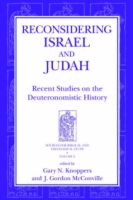
Reconsidering Israel and Judah
Recent Studies on the Deuteronomistic History
Edited by Gary N. Knoppers and J. Gordon McConville
Reconsidering Israel and Judah
Recent Studies on the Deuteronomistic History
Edited by Gary N. Knoppers and J. Gordon McConville
The Deuteronomic or, more properly, Deuteronomistic History is a modern theoretical construct which holds that the books of Deuteronomy, Joshua, Judges, Samuel, and Kings constitute a single work, unified by a basic homogeneity in language, style, and content. This construct owes much to the influence of Martin Noth’s classic study of the Deuteronomistic History, contained in his larger Uberlieferungsgeschichtliche Studien. According to Noth, the Deuteronomist incorporated the deuteronomic law into the beginning of his work, framing it with speeches by Moses. The Deuteronomist then added other sources, such as tales of conquest and settlement, prophetic narratives and speeches, official annals and records.
- Description
- Table of Contents
While this larger thesis has stood the test of time, there is much disagreement among contemporary scholars about a wide variety of issues. The present collection attempts to provide readers with an understanding of the important developments, methodologies, and points of view in the ongoing debate. Both current essays and some older, classic essays that have shaped the larger debate are included. Ten are newly translated into English. Each essay is prefaced by a detailed foreword by one of the editors that summarizes and places the essay in its appropriate context, making the volume ideal for use in seminars or courses, as well as for individuals wishing to become familiar with the state of discussion on the Deuteronomistic History.
Part 1: The Theory of a Deuteronomistic History and Its Refinements
The Central Theological Ideas - Martin Noth
Speech and Prayer in the Deuteronomistic and the Chronicler’s Histories - Otto Ploger
‘Histories’ and ‘History’: Promise and Fulfillment in the Deuteronomistic Historical Work - Helga Weippert
The Kerygma of the Deuteronomistic Historical Work - Hans Walter Wolff
The Themes of the Book of Kings and the Structure of the Deuteronomistic History - Frank Moore Cross
The Law and the Nations: A Contribution to Deuteronomistic Tradition History - Rudolf Smend
Part 2: Deuteronomy, Joshua, Judges
Deuteronomy in Search of Origins - Thomas Romer
The Succession of Joshua - J. Roy Porter
Gilgal: A Contribution to the History of Worship in Israel - Hans-Joachim Kraus
The Role of the Priesthood in the Deuteronomistic History - Richard D. Nelson
The Deuteronomistic Theology of the Book of Joshua - Gordon J. Wenham
The Deuteronomistic from Joshua to Samuel - John Van Seters
Joshua 24 Re-examined - S. David Sperling
Part 3: Samuel, Kings
The Apology of David - P. Kyle McCarter, Jr.
The David-Saul Narrative - Walter Dietrich and Thomas Naumann
David’s Rise and Saul’s Demise - Robert P. Gordon
Solomon: Bathsheba’s Firstborn - T. Veijola
1 Kings 8:46-53 and the Deuteronomic Hope - J. G. McConville
Prayer and Propaganda: Solomon’s Dedication of the Temple and the Deuteronomist’s Program - Gary N. Knoppers
Dog Food and Bird Food: The Oracle against the Dynasties in the Book of Kings - Steven L. McKenzie
Which Oracle Granted Perdurability to the Davidides? A Textual Problem in 2 Kings 8:19 and the Function of the Dynastic Oracles in the Deuteronomistic Historical Work - Norbert Lohfink
Part 4: New Directions
Toward a Redactional History of the Book of Kings - Andre Lemaire
Ephraimite versus Deuteronomistic History - Alexander Rofe
Redaction, Recension, and Midrash in the Books of Kings - Julio Trebolle Barrera
The Royal Novella in Egypt and Israel - Siegfried Herrmann
The Counsel of the ‘Elders’ to Rehoboam and Its Implications - Moshe Weinfield
The State of Israelite History - Baruch Halpern
New Directions in the Study of Biblical Hebrew Narrative - David M. Gunn
The Centre Cannot Hold - J. Cheryl Exum
What, If Anything, Is 1 Samuel? - David Jobling
Mailing List
Subscribe to our mailing list and be notified about new titles, journals and catalogs.



